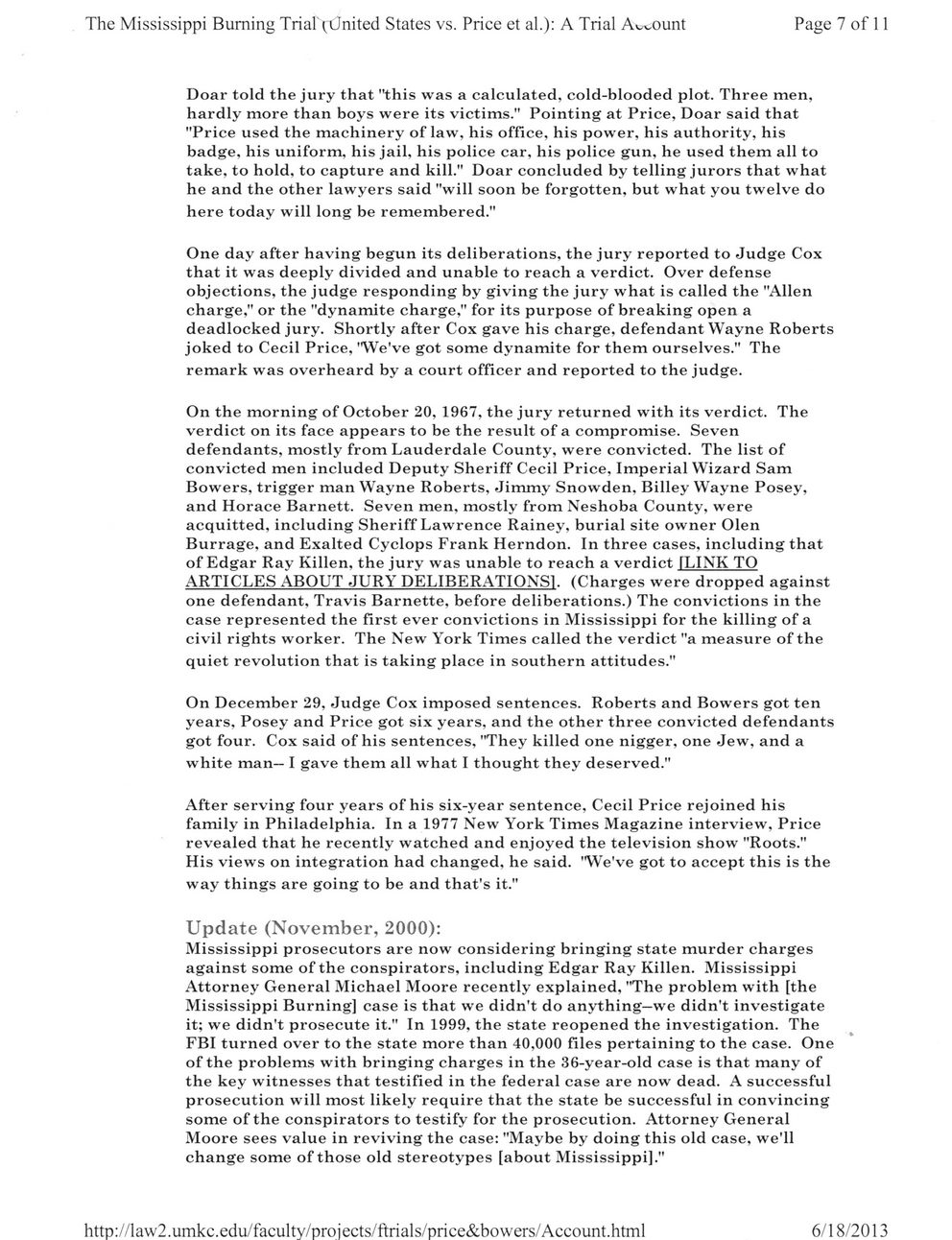This text was obtained via automated optical character recognition.
It has not been edited and may therefore contain several errors.
The Mississippi Burning Trial'(United States vs. Price et al.): A Trial Amount Page 7 of 11 Doar told the jury that "this was a calculated, cold-blooded plot. Three men, hardly more than boys were its victims." Pointing at Price, Doar said that "Price used the machinery of law, his office, his power, his authority, his badge, his uniform, his jail, his police car, his police gun, he used them all to take, to hold, to capture and kill." Doar concluded by telling jurors that what he and the other lawyers said "will soon be forgotten, but what you twelve do here today will long be remembered." One day after having begun its deliberations, the jury reported to Judge Cox that it was deeply divided and unable to reach a verdict. Over defense objections, the judge responding by giving the jury what is called the "Allen charge," or the "dynamite charge," for its purpose of breaking open a deadlocked jury. Shortly after Cox gave his charge, defendant Wayne Roberts joked to Cecil Price, 'We've got some dynamite for them ourselves." The remark was overheard by a court officer and reported to the judge. On the morning of October 20, 1967, the jury returned with its verdict. The verdict on its face appears to be the result of a compromise. Seven defendants, mostly from Lauderdale County, were convicted. The list of convicted men included Deputy Sheriff Cecil Price, Imperial Wizard Sam Bowers, trigger man Wayne Roberts, Jimmy Snowden, Billey Wayne Posey, and Horace Barnett. Seven men, mostly from Neshoba County, were acquitted, including Sheriff Lawrence Rainey, burial site owner Olen Burrage, and Exalted Cyclops Frank Herndon. In three cases, including that of Edgar Ray Killen, the jury was unable to reach a verdict [LINK TO ARTICLES ABOUT JURY DELIBERATIONS!. (Charges were dropped against one defendant, Travis Barnette, before deliberations.) The convictions in the case represented the first ever convictions in Mississippi for the killing of a civil rights worker. The New York Times called the verdict "a measure of the quiet revolution that is taking place in southern attitudes." On December 29, Judge Cox imposed sentences. Roberts and Bowers got ten years, Posey and Price got six years, and the other three convicted defendants got four. Cox said of his sentences, "They killed one nigger, one Jew, and a white man— I gave them all what I thought they deserved." After serving four years of his six-year sentence, Cecil Price rejoined his family in Philadelphia. In a 1977 New York Times Magazine interview, Price revealed that he recently watched and enjoyed the television show "Roots." His views on integration had changed, he said. "We've got to accept this is the way things are going to be and that's it." Update (November, 2000): Mississippi prosecutors are now considering bringing state murder charges against some of the conspirators, including Edgar Ray Killen. Mississippi Attorney General Michael Moore recently explained, "The problem with [the Mississippi Burning] case is that we didn't do anything—we didn't investigate it; we didn't prosecute it." In 1999, the state reopened the investigation. The FBI turned over to the state more than 40,000 files pertaining to the case. One of the problems with bringing charges in the 36-year-old case is that many of the key witnesses that testified in the federal case are now dead. A successful prosecution will most likely require that the state be successful in convincing some of the conspirators to testify for the prosecution. Attorney General Moore sees value in reviving the case: "Maybe by doing this old case, we'll change some of those old stereotypes [about Mississippi]." http://law2.umkc.edu/faculty/projects/ftrials/price&bowers/Account.html 6/18/2013

Ku Klux Klan Mississippi-Burning-Trial-(7)